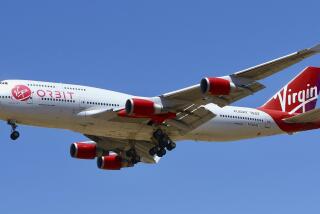Textron Puts Bell Helicopter Unit Up for Sale
- Share via
PROVIDENCE, R.I. — Textron Inc. put a “for sale” sign on Bell Helicopter on Monday as part of its divestiture effort to raise $1 billion and erase some of the $1.4-billion debt it took on when it bought Avco Corp. in January.
Purchased by Textron in 1960, Bell at one point accounted for one-third of Textron’s earnings and today remains the conglomerate’s largest subsidiary.
“Bell Helicopter has long been an integral part of Textron, and this has been a difficult decision to make,” Textron President and Chief Executive B. F. Dolan said in a prepared statement.
“We have decided to pursue the sale of Bell because the sale would generate significant cash for debt reduction,” Dolan said.
In an interview last December, just after the deal was struck for the purchase of Connecticut-based defense giant Avco, Dolan said: “Bell has grown so big and so fast that it’s out of sync with the rest of the company.”
The extreme dependence on Bell made all of Textron overly vulnerable to swings in that one industry, he indicated.
The three divisions of Bell, based in Fort Worth, employ about 7,200 workers making a broad range of commercial and military helicopters.
In the 1960s and early 1970s, Bell grew rapidly through huge military contracts during the Vietnam War and from orders for hundreds of helicopters from the Shah of Iran.
Toward the end of the 1970s, Bell expanded even further as offshore oil drilling boomed and companies bought helicopters to ferry crews from land to the floating oil derricks.
Despite Bell’s performance for Textron over the years, the company last year accounted for just 12% of Textron’s earnings as offshore oil drilling activity slumped.
According to Textron spokesman Raymond W. Caine Jr., during 1984, Bell contributed operating income of $30.2 million on revenue of $672 million, compared to income of $48 million on sales of $766 million in the year before.
Before the Avco purchase, many analysts said Textron might itself be susceptible to a takeover because of the wide diversity of its divisons: Homelite chainsaws, Speidel watchbands, Jacobsen lawn mowers, Sheaffer Eaton pens and paper and Gorham silver products, in addition to defense and aerospace products.
Textron fended off an unfriendly suitor in October, 1984, when Chicago Pacific Corp. offered $1.6 billion for the company, and some analysts at that time said it was time for Textron to slim down.
Laurence Baker of E. F. Hutton & Co. in New York said Monday that the Bell sale makes sense because, despite its recent slippage, Bell remains a good name in the industry and is “probably one of the more marketable businesses” in the Textron group.
Analysts also have speculated that Textron might be considering unloading its Gorham and Speidel divisions. “If they’re not (selling them), they ought to,” Baker said.
Another analyst, however, said the Bell sale has nothing to do with streamlining Textron and is related only to what Textron paid for Avco.
“They have said they were very serious about getting $1 billion on that debt paid off within 12 months,” the analyst, who asked not to be identified, said.
What Bell might be able to produce in the future may have influenced Textron’s decision, according to Howard Nichol, an industry analyst for Advest in Hartford, Conn.
“It looks to me like the helicopter business is shrinking and consolidating.”
More to Read
Inside the business of entertainment
The Wide Shot brings you news, analysis and insights on everything from streaming wars to production — and what it all means for the future.
You may occasionally receive promotional content from the Los Angeles Times.










